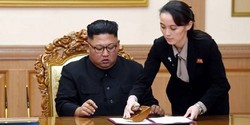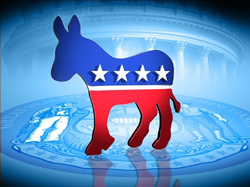While President Joe Biden prepares to release his Korean policy, the sister North Korean Leader Kim Jong Un, Kim Yo Jung, warned the United States to not “cause a stink,” on Tuesday, March 16.
The state news agency KCNA has reported that Kim Yo Jong said, “If it wants to sleep in peace for the coming four years, it had better refrain from causing a stink at its first step.” Kim Yo Jong has also criticized South Korea and the United States for running linked military exercises.
KCNA reported that the North Korean leader’s sister made a reference to gunpowder when she said that North Korea apparently took “this opportunity to warn the new U.S. administration trying hard to give off powder smell in our land.”
Saliba Sarsar, Ph.D., Professor of Political Science, said that Kim Yo Jong’s warning the U.S. not to cause a stink with North Korea emanates from decades of distrust toward the U.S., which North Korea views as “its biggest enemy.”
“The military exercises that the U.S. and South Korea have conducted over the years, now done as computer simulations, are perceived as provocative by and cause great concern in North Korea,” said Sarsar.
Sarsar said that the Biden Administration is aimed to reenergize its special relationships with its allies, South Korea and Japan.
“It is no surprise that the first international trip for each of U.S. Secretary of State Antony Blinken and U.S. Defense Secretary Lloyd Austin was to Seoul and Tokyo,” said Sarsar.
“The U.S. concern is North Korea’s nuclearization and threat to its allies in the region and elsewhere around the world. According to the Council on Foreign Relations, North Korea is believed to have 60 nuclear weapons, chemical and biological weapons, and 1.2 million active troops, making it the world’s fourth-largest military force. In addition, it continues to test its ballistic missiles.”
Sarsar also said that the Biden Administration’s calls to North Korea about its nuclear weapons and ballistic-missile programs have not been answered, and South Korea’s outreach to North Korea to continue their military dialogue has also not been reciprocated.
Kevin Dooley, Ph.D. Associate Professor of Political Science, said that the government of North Korea makes these statements to other countries for a variety of reasons.
“First, it needs to project a sense of power. Of course, it lacks the kind of power it is projecting, but it needs to appear that it is willing to stand up to the United States,” said Dooley.
He said that the second reason is that North Korea has benefitted greatly from its relationship with China. “China has invested a lot of time and money in North Korea. As a result, it can make these kinds of statements, because the United States continues to rely on trade with China,” Dooley said.
He continued by saying that the Biden Administration will conduct military exercises and the government of North Korea will continue to condemn them. Dooley said the reasoning for this is that it allows all sides to demonstrate power and therefore save face with their respective audiences.
Sarsar said that while North Korea is no match for the U.S., it behooves the U.S. to rethink its approach toward North Korea. He said that economic sanctions have not convinced Pyongyang to denuclearize or stop its ballistic-missile program.
“U.S.-South Korea military exercises close to North Korea’s borders have only rankled the Kim Jong-un regime. While remaining vigilant, the U.S. should do its utmost to stabilize conditions in the Korean Peninsula,” said Sarsar.
He said this can be achieved by re-engaging North Korea, setting realistic goals with reciprocal steps and measurable outcomes, consulting with allies in the region and beyond, and asking China to assist in moderating the ambitions and plans of Kim Jong Un.
“For example, a halt in U.S.-South Korea military exercises in return for a halt in North Korea’s nuclear and strategic missile tests,” said Sarsar.
Matt Filosa, a junior political science student, believes that the Biden Administration will take a cautious, but not weak approach to North Korea. He believes it will be less threatening than former president Donald Trump, but no friendly meeting with Kim Jung Un. Filosa feels that it will be similar to the Obama era policy on North Korea.
“The U.S. always needs to maintain a careful eye on North Korea since tensions seem to rise and fall. The usual thing tends to happen each time so it’s just a cycle,” said Filosa.
Filosa said that if he had to put North Korea in an analogy, he would describe them as a “bratty little kid.”
“For our own security and that of the Asia pacific region. Keeping them in line and having them stick to themselves is best,” said Filosa.
IMAGE TAKEN from Moneycontrol



